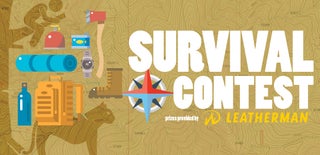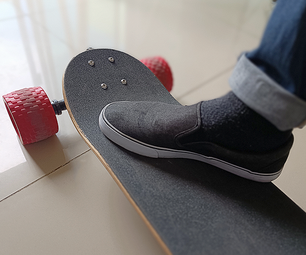Introduction: Disaster Pack: Urban Edition, 50 Shades of Grey...
This kit revolves around the "grey man" concept (Sorry no NC-17 content here) and was partially influenced by this ible here: https://www.instructables.com/id/My-Bug-Out-Bag-Gra...
For those of you unfamiliar with the concept, the "grey man" is the ambiguous bystander. He (or she) doesn't stand out from the crowd. It doesn't mean they're a master of disguise, just that they aren't shouting from the mountain tops, "I've got stuff! Please, everyone look at me!" Instead, they blend into the background like a poorly paid extra to detract from the fact that they've got their proverbial sh*t together.
As with most of my kits, no special training is really required to use the items contained therein and everything should be readily available at your local five and dime. Of course, the most critical aspect of survival is your survival mentality. Given that you're reading this ible, I'd say you're on the right track! Let's dig in!
*Authors note: I gave myself a few restrictions/guide lines in the development of this kit. For instance, there are no knives, ferro rods or pry bars contained therein. I'll explain why later. Also, I wanted the entire bags "wet weight" (meaning, containing water; you'd be surprised just how much water weighs!) to be well under 20lbs. Lastly, I wanted to ensure that there was enough empty space to be able scavenge if necessary. You've got to be more fluid in your thinking when trying to survive in the concrete jungle.
Double note: Please vote for me in the survival/remix 2.0 contest by clicking the trophy icon in the righthand corner of the orange band atop your screen if you dig it. Comment and tell me why if you don't. Constructive criticism is always welcome, Cheers! As always take what you need, ditch the rest.
Step 1: Now You See Me...
Given that this ible is about the kit, that's where we're gonna start. If you've got hot pink gauges (earrings that stretch the ear lobe) facial tattoos like Mike Tyson and bright blue hair, blending in might not necessarily be a viable option... for the rest of us it begins with the bag.
I've watched dozens of YouTube vidoes and combed through probably hundreds of forums at this point, and everyone's got something to say...
"You should look military; that way no one will want to mess with you..."
"If your loaded to the gills, you're making yourself a target..."
"Camo bags scream prepper."
"Everyone wears camo nowadays..."
Whichever side of the debate you fancy, the fact of the matter is, it's better to not be considered at all, rather than a as a threat or target of opportunity. Enter the Grey man.
Step 2: The Pack
In the end, it is what it is. If you feel as though in your neck of the woods you can be decked out in camo from head to toe without anyone batting an eye, go for it! Myself, I live in a College town (university actually, but there's no need to sound pretentious) with college students galore. It's doubtful 90% of people where I live have spent any time in the woods, and as such, I've chosen ol'fateful (my actual book bag from back in the day) as my pack of choice.
It's funny, but way back when, before I got into preparedness (sue me I don't wanna be called a "Prepper"), I bought this bag because I thought it looked cool. Now a little older, a little wiser, I can see all the key features I'd never really appreciated before: well padded shoulder straps, cinch straps, sternum straps, hip belt, grab handle, the list goes on. What I like most about it these days however is that it looks... ordinary.
Sure, it's got all these bells and whistles, but these days so do most bags. It's a nondescript color, fits me well, and it's withstood the test of time. Can't argue with that!
Step 3: The C's and Such
I have to say, my hat's off to Dave Canterbury for coining the 10 C's of survivability (for those unfamiliar, they are: Cutting tool, Combustion device, Cover, Container, Cordage, Cotton bandana, Compass, Candling device, Canvas needle and Cargo Tape). It's not because their brilliant, pertinent and easy to remember. It's because they're just good common sense, and having coined them as his "10 C's of survivability," now every gear list ever made there after will look as though they've used his mantra as their framework! That glorious bastard...
All of the C's are essentially covered in this kit with the exception of the canvas needle, though if you were to include my EDC (see that ible here: https://www.instructables.com/id/Pocket-urban-surv...that'd be covered as well. As it's already a pretty well established framework (Damn you D.C.), we'll use the aforementioned C's to break down the content into more manageable segments. Walls of text can be brutal.
When assembling a kit, it's important to realize where you are, where you're going and what it might take to get you there safely. Not every disaster is going to be a doomsday scenario that will shake civilization to it's core. In all likelihood it's apt to be a bit more mundane i.e. hurricanes, tropical storms, fires etc. Remember, being prepared doesn't equate to being scared or paranoid. It's being ready, come what may.
,
Step 4: Cutting Tool & Cordage
Cutting tool: Just because the worlds gone to heck in a hand basket doesn't mean that we're all living in a WROL (Without Rule Of Law) type environment. Knives have a certain connotation to them, especially big knives. While you can absolutely carry a BECKER BK2 into the woods, try getting one onto a plane!
*Disclaimer: Don't actually try and get a knife onto a plane. That wasn't a dare.
Scissors, on the other hand, are generally considered less stabby by nature and can be as effective as a knife, particularly in an urban environment. The model I've chosen is the FISKARS CUTS MORE PLUS for a number or reasons. They come with a sheath and built in sharpener for one. Also, if you do need a knife for whatever reason, the blades separate so that "TADA!" you've got a knife! Well, technically two knives but who's's counting..? They're a little on the pricy side, just north of $20.00USD, but they're also titanium. You take the good with the bad.
Cordage: For cordage, just about anything will do from jute twine to paracord, it all depends on your budget and intended use. For this kit, I chose No.36 tarred bank-line purchased through the Pathfinder School LLC. You can go ahead and pick this stuff up at Walmart but "Cavaet Emptor," you'll get what you pay for. I typically use paracord for everything, but thought I'd give this stuff a try after having read about it in half a dozen different forums. I have to say, I'm pleasantly surprised. It's stiff and easy to work with, holds knots well and doesn't really fray unless you intentionally splay apart the braiding, and boasts a tensile strength just shy of 400lbs. Purchasing it by itself is a little pricy though, so tack on some fix'n wax and your good to go.
Step 5: Cover & a Cotton Bandana
The Cover of the 10 C's is more so a blanket term (Get it?) It embodies a wide array of gear from your hat and gloves right on down the line to your three season Coleman sleeping bag. Of course, there's no Sleeping bag in this kit, we're trying to remain inconspicuous remember? You won't be as comfortable, bottom line. But you'll have enough gear tucked back to keep relatively warm and dry. Besides you're in a city/urban environment; there should be any number of man made structures to shelter under/in. That being said:
Rain gear: I'm personally not a fan of single use items and mil-spec poncho might look a little out of place, as such I went with a full on rain jacket. I know, I know, "I thought we were trying to blend in?" Well, that's the idea, but this is all I had. It's warm, rain proof, good for signaling, should the need arise, and big enough on me to throw over my pack as well. "What supplies? I don't have any supplies." The rain pants are a little more subdued and are also wind proof ta boot. These two also serve as a change of outerwear should something happen to my civvies.
Skivvy roll: Because mom always said I should wear clean underoos.
Thermal blanket: If you're going to buy a mylar blanket spend the extra few bucks and go with a quality product. The one I choose is large enough for two and durable enough to make an impromptu shelter if need be. The cheaper of their ilk generally don't hold up to much use, let alone abuse, and getting it back in it's original packaging... "Fuhgeddabouit"
Wool beanie: If your trying not to stand out, a boonie hat may not be the best choice. You could go for a baseball cap, but I prefer a wool beanie. Wool is a great insulator and will retain heat even when wet! Plus, I think they're stylish in that whole stoner kind of way.
Work gloves: If you've got to negotiate rubble or navigate on your hands and knees through broken glass, you'll be glad for the added protection. I like these rubberized work gloves because they do a decent job protecting my hands and lessen the grip strength required when handling objects.
Cotton bandana: Plethora of uses. not much more to say really... Some people opt for a Shemagh or Keffiyeh (basically a much larger bandana) but the colors and patters are a little too out of place in the US for my liking, and I'd be worried that they might send the wrong message to the ignorant or uninformed.
Step 6: Combustion & Candling Device (Fire & Flash Lights)
Whether caves crafted by God or men, there are many a dark place in the world. Having a light with which to banish the darkness to the far reaches of ones imagination is a must, for both sanity and security.
The lights I've chosen for this kit all work to serve a particular purpose. I've included a headlamp for handsfree shenanigans and a lantern/torch combo to provide both directional light (as a flash light) and omnidirectional light (as a lantern). Both units operate off of lithium AAA batteries, so I've no worries about them losing charge over time and it allows for the transference of power from one to the other as needed.
*Note: Some people opt for lights requiring special lithium cells i.e. CR123's. Personally, I've never once seen them available at my local gas station or grocer, something to consider when resupply options are limited.
Candle: Who would have thunk it? A candle for a candling device, but it makes sense. I also like that it allows me to bring fire safely indoors with little likelihood of causing an incident. There are a number of camp candles or emergency candles on the market. I've chosen this one because I like the three wick design and I appreciate the tin, which once liberated of said candle, leaves me with yet another container, albeit a small one. This candle in conjunction with the water bottle I've chosen also serve as an alternative source of water purification (i.e. boiling!) I keep a small box of matches contained therein and keep the whole shebang wrapped in a little electrical tape to keep it water tight.
Step 7: Container, Compass and Cargo Tape.
Water is a vital resource, as is making your way from point A. to point B. while finding water along the way. With that in mind, I've included the following gear to do just that:
Container: Now in an urban environment containers are everywhere. All you need do is check you nearest dumpster or waste bin. For those of you with an aversion to dumpster diving, I give you the stainless steel water bottle. I've gone with an 18oz Klean Canteen which I picked up at the local thrift store for $1.00USD. I know it's not a lot of water and I get that, but what I was looking at here was volume.
If I lose my main water purification method, than at least I have a back up. The small backpacking candle I've included in this kit is great, but a camp stove it is not. If I want to be able to adequately boil water sufficient to kill what otherwise might kill me (or in the least, ruin my day), than I can't go getting all crazy with a full 40oz. The more volume, the more energy required to bring said volume to boil. Physics- aint it fun? Hence the smaller bottle. Of course, I could always bring a larger bottle and only fill it up half way... But I didn't, so there!
Life straw: My primary means of water purification/procurement. From toilet bowls to puddles, these are designed with no moving parts and minimal care. making them practically bomb proof. Just try not to lose it, or step on it.
4 way Sillcock Key: Known as a water key in some circles, these are handy for getting at water sources otherwise inaccessible, like the spigots on the sides of most gas stations or municipal buildings. Just be sure not to go getting yourself into anything you cant get yourself out of. Those spigots don't have access valves for a reason. You could try using a small crescent wrench, but some of the valves have a bit of a recession to them, making the leveraging of a wrench impossible.
Compass: In this kit I don't have a physical compass per say, instead I have what every red blooded american has, their cell phone! I have the army emergency navigation app on my phone, which should work even in a grid down type scenario. If not, I can always fashion one in the field, as there are no end of ferrous objects littering the streets of any major (or minor) US city. If that's not in your skill set, a good street map of the area can work wonders! No map, no worries. Most cities have some sort of rail system or mass transit system, find a stop or a station and you can typically get your bearings from there, as there's usually a posted route, usually...
Cargo tape: Though not actually cargo tape, but a fanciful way to turn a D into a C. Duct tape should be a apart of every kit. I make it a habit of having a small roll in every kit I put together. Of course, I end up using it out of the kits and run out....
*Mental note: Buy more duct tape*
Step 8: Security and Self Defense
No guns. Sorry folks but you're not going to hear me wax poetic about my AR15, or decked out chest rig with plate carrier. No, here I've taken a more minimalistic approach and have gone the less then lethal route.
Pepper spray: Tried and true, pepper spray is a great alternative for those of us without the zeal of the NRA aficionados. Just be sure that you're upwind of your would be attacker, otherwise you'll be that much worse off then when you started. Also. be sure to get the highest concentration of capsaicin permitted in your area. That's the active ingredient in pepper spray and some states regulate what a citizen can use/carry. Be sure to abide your local statutes or be prepared for the consequences.
Pad lock: I like the concept that if I find somewhere safe, I can keep it that way or make it that way with a bit of salvaged chain and a lock only I have the key to. Also, this item combined with the cotton bandana creates a devastating impromptu flail! You know, just in case you find yourself having to get all medieval on someones tuckus.
Any lock will work but I like the kind that you can't really get ar with bolt cutters and i personally prefer keys over combos. Sure you can pick a lock but that's a skill set not many people in my area have I reckon. If all else fails you could always fork the door: https://www.instructables.com/id/Lock-a-door-withou...
Whistle: Good to sound the alarm or signal for help. I've got this one rigged up to one of the shoulder straps for quick and easy access. I attached it to one of those Keycard holders with the retracting lanyard for convenience sake. It also acts as a dummy cord so i don't lose it.
Step 9: Communication and Power.
We live in the modern era and though I'd often like to believe that I'm above the trappings of modern civilization I still find myself checking my e-mail and Facebook more times in a day then I care to mention. Being able to communicate and gather information is important no matter how you slice it, and having the tools on hand with which to do so effectively is an absolute must.
Cell phone: Of course if things go sideways cell reception may be nil. But cell service can be restored and Cell phones can do a lot even without service. There's FM radio apps (a great many phones have the ability to receive FM radio even without cell service) and Nav. apps that don't require service. If the lines are bust and you can't get a call through there's always text messaging. Most phones will continue to try to send and receive texts continuously till they are able to get through. The bottom line is that a cell phone should be a part of any disaster preparedness package.
Back up battery charger: I picked up this little beauty when my local RadioShack went the way of the dinosaur for a song and never looked back. It's got enough juice to give my phone a good three - four charges before copping out on me. That's enough juice to get me by for at least a week. I keep it in a little external hard-drive case I picked up from my local Staples before they went bust and paired it with a spare charging cable I had laying around.
Baofeng VHF/UHF dual band radio: I am still quite the novice with this nifty little gadget but so far I'm pretty pleased with it. You have the capability to transmit on either band (though doing so is illegal without a license, be forewarned) and receive just about anything and everything out there. Plus you can't beat the price *sub $25.00USD on Ebay or Amazon. All in all it makes a great addition to this little kit.
The only problem with it, is that it requires some preprograming to get it working smoothly and for that you really need a specialized cable (sold separately), software: i.e. CHIRP: http://chirp.danplanet.com/projects/chirp/wiki/Ho... and most importantly patience! I've upgraded the battery from stock to a battery pack that takes 6 AAA's instead. Again, I use lithium cells. I'm testing now to see if I still get the same amount of life out of the radio, we'll see. I did this to avoid having to tote around the charging dock and a/c adaptor. Every once counts!
Step 10: Pockets, Their Like Mini Packs in Your Pants!
Needless to say there are just some things you can't, or rather shouldn't have squirreled away in the bottom of your pack in an emergency: cash for one and documents, another. The harsh reality is that the more desperate the situation the more desperate the people living through it.
If someone asks for your pack and you're not in a position to flee or defend yourself, give it to them. There's nothing in this pack I cannot live with out. Sure, not having this gear on you when you need it could prove problematic, but not as problematic as a bullet or a stab wound! To that end, there are a number of things you should carry in your pockets or otherwise on your person.
Cash: Cash is king and it's home need not only be in you wallet; a sock, a bra, in your shoe... Get creative! Cash is the proper tool in any number of situations. So long as the greenback has value, you'll have a means to procure what you need, when whatever you had is gone.
Personal identification: Depending on just how bad things are, you may very well have to be able to prove who you are and that you belong where you belong. Not having an ID can make you a person of interest if the authorities stop you at the border.
Misc. documentation: Insurance papers, marriage certificates, medical records. If necessary you could always carry these with you on an encrypted flash drive, but keep in mind that scans of most federal documents aren't valid without a raised seal. Still, it's piece of mind. I like the micro SD card/adapter combo myself. There are a lot of places you can hide a micro SD card!
*Side note: Do not laminate your social security card! If it's falling apart take an afternoon catching up on your reading at the S.S. office and get a new one! Learned that lesson the hard way.
I like the concept of those travel body wallets for the above items. That way if you get mugged after someone else steals your pack (bad luck for you) you can hand over your wallet without handing over your entire life while you're at it; just be sure that there's some cash in it to keep them from trying to make the best of a bad situation (theirs) by asking for your cloths, shoes etc.
Step 11: And One to Grow On!
I honestly cannot believe I've gotten this far and haven't yet mentioned food. I do have some goodies packed away for a rainy day in this pack. But solely foods you can eat on the go.
Lets face it, you're not going to go foraging for chanterelles in the lower east side or morels in Harlem (Those are both New York references for those of our out of town friends and mushroom references for the non-culinarians)
In all likelihood the "wild" edibles your apt to find in a city are likely to be found amongst refuse and not worth mentioning. Decisive to say; When you're hungry, I mean, really hungry, your's becomes an appetite without borders and all sorts of things you'd have never consider cramming down your gullet start to look appetizing. Till then, it's nice to have a bit of nibble here and there. Hence the snacks.
You cannot grow food through concrete. Have a plan for when the food runs out... and it will!
Step 12: Thanks But No Thanks.
Bolt cutters/pry bars/breaching tools: Sure these could be handy in a pinch. But they can also be construed as tools for more purposes more nefarious then survival. In a WROL maybe these might be warranted. Personally, I think under most circumstances you're libel to get into trouble or wind up injured/dead by their implementation. I'll leave these in the tool box at home thank you.
Fire Arms: Honestly, if you have the legal capability to carry a weapon and the good judgment to know that a gun is as much a tool as a weapon. Well, that's your prerogative. My wife abhors guns and I care about her more then I care about some shiny piece of kit I hope never to use. Besides she never said anything about a Bow... humm,,,
Parangs, combat knives, Machetes and the like: Honestly, I live in a city that may as well be a suburb. Never will I ever have the need to own a knife larger then I can cook with and their place is in the kitchen. Besides, I doubt things will ever go to pot to the extent that it'll be permissible to carry a foot long hunk of baddass into the local High school shelter.
Zip ties: I don't know why really. I have them, just something in my gut tells me that I don't want to be the guy with rope, duct tape and zip ties in his bag traipsing around the mall. Maybe it's just me...
Water filters: In trying to blend in it's hard to keep something like a water filter under wraps for too long... a life straw is small and doesn't take much fuss to use. Can't really say the same of a $200.00+USD katadyn "pocket" water filter.
Multi tool: I just don't have a good one. Maybe if I win this contest, eh? Seriously, a mulit tool is a great option for carrying a whole lot of gear in an exceedingly small footprint. This is one of those items that should be kept on your person. That way, even if your pack gets carried away by a pack of rabid badgers you'll still have a leg up with tools enough, to help you keep on, keeping on and that's what survival is all about.
Medical kit: I have a minor injury kit with me at all times so I skimped out on adding one here. A zip lock with some boo boo stuff and some disinfectant wouldn't be a bad idea. The nice thing about a city is that there's usually help within ear shot. If not, consider something like my full blown medical kit: https://www.instructables.com/id/Disaster-prepared...It'll add about a pound of gear but could save your life or someone else's, weight your options.
Deliciously random question: Would a large grouping of badgers be considered a pack, a swarm, a gaggle, a murder? Just curious. Leave it in the comments if you know. Thanks for reading it through, Cheers!

Runner Up in the
Survival Contest

Third Prize in the
Remix 2.0 Contest













